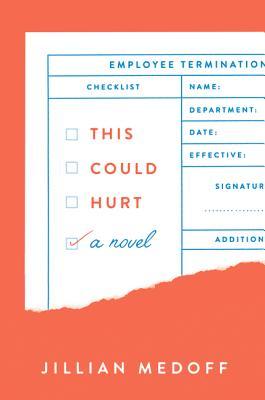Review: Jillian Medoff’s “This Could Hurt”
by Miles Raymer
Jillian Medoff’s This Could Hurt is a fun and heartfelt fictionalization of contemporary corporate life. The book explores the lives of a small group of executives who run the Human Resources Department at Ellery Consumer Research, a firm struggling to keep itself together in the wake of the 2008 financial crisis. While I did not find the story particularly moving and thought the writing was merely serviceable, I enjoyed getting to know the characters and contemplating Medoff’s many excellent insights about the nature of modern work.
The message of This Could Hurt can be summarized thus: despite the fact that laboring in a cutthroat capitalist economy can be utterly dehumanizing, people still manage to inject a lot of emotion and compassion into corporate machinations. Medoff’s narrative maintains an engaging balance between warm humanism and cold calculation, between the dreams and desires of the characters and the profit-driven numerical realities that dominate their lives. Here are a few passages that illustrate this dynamic:
A business was not a family––period. Yet what fueled an employee’s success, and in turn, the company’s, were the very qualities that bound a family: loyalty, diligence, humor, grace. (loc 415)
It’s all connected––our policies and people, our corporate personality, how we’re perceived––and it all flows through HR. That’s the first thing my mentor taught me. HR is the warm, beating heart that pumps blood into the organization. HR gives the company life, and as chief, everything flows through you. But to be successful, you must consider the whole organ; if you only focus on one artery, you kill off the patient. (loc. 1263, emphasis hers)
Business can be awful, but you have to rise above it; one way is to show your humanity when everyone else’s has disappeared. (loc. 2646)
These are the perspectives of Rosa Guerrero, the longtime head of HR at Ellery. She’s an endearing character from a disadvantaged background who climbed the corporate ladder by virtue of much grit and dedication. As the de facto Head of HR for a small company (much smaller than the one depicted in this novel), Rosa’s attitudes rang true for me. She nicely articulates the ways in which I try to carve out a legitimate space in my business for emotions and psychology amongst all the financial reports and competitive necessities. I count myself lucky to be part of an organization that, at least up to now, has retained a lot more of its humanity than Ellery Consumer Research.
Although Rosa is definitely the central character, the reader is treated to the internal perspectives of several other key members of HR at Ellery, each with particular strengths, weaknesses, successes and failures. The character development here isn’t top-notch, but it’s also not absent; in the end, I was genuinely pleased with how all the characters evolved.
Despite Rosa’s outlook and efforts, Ellery is a fairly harsh work environment where one misplaced comment can compromise a career and backstabbing for personal gain is common. I’ve no reason to think this isn’t typical of most work environments, and probably worse for folks in high-stakes corporate America. The question of whether influence and money can provide a meaningful life pervades the pages of This Could Hurt, and Medoff does herself a favor by not getting too preachy and allowing the story to speak for itself. Along the way, we encounter lots of topical themes, such as unconscious homophobia/racism, adult male friendship, sexism in the workplace, our culture of comparative consumerism, and work-life balance. Medoff’s handling of these themes isn’t unusually adroit, but she doesn’t fumble the ball either. The character arcs are not uniformly positive or negative, allowing for a plurality of outcomes that feel somewhat cliché but generally realistic.
In one sense, This Could Hurt is an incisive indictment of our hyper-capitalist moment. There’s little doubt that 21st-century globalization values profit and power over people at every turn. This perspective is perhaps best captured by Kenny, Rosa’s hotshot subordinate with a degree from Wharton Business School:
As a business leader, Rosa had critical limitations. She was plodding, unevolved, like most older managers who came of age without technology. What mattered in the twenty-first century was synergy, automation, and fast-moving systems rooted in sold org theory, not the slow putt-putt of outdated worker-centric business models. Rosa’s Big Idea was to invest in employees, which was fine if you had a machine that could time-travel back to 1995. In current thinking, people were only as valuable as the underlying processes; intellectual capital could be outsourced, so systems should allow for interchangeable staff––cheap labor, quick turnover, that’s what yielded profits. (loc. 2344)
The saddest aspect of Kenny’s perspective isn’t that he’s wrong, but rather that he’s dead right. We are living through a time when solid investment in people usually makes less sense than investment in technologies and/or services that can make a business far more successful for less––plain and simple. This grim truth gets my inner Marxist all worked up, makes me long for a guarantee that capitalism isn’t humanity’s economic end-game, but rather a necessary stepping stone toward far fairer and more humane systems of reward and distribution. And while that long-term possibility is beyond the scope of this novel, Medoff doesn’t leave the reader feeling hopeless. In the end, This Could Hurt left me contented, energized, and convinced that genuine happiness and meaning are still within reach for those who learn to peek beyond the blinders of the modern workplace.
Rating: 7/10
